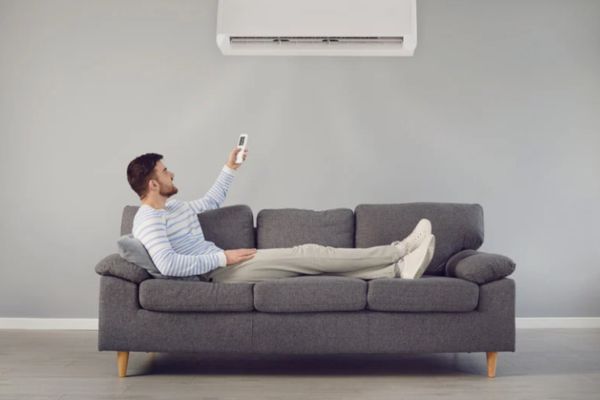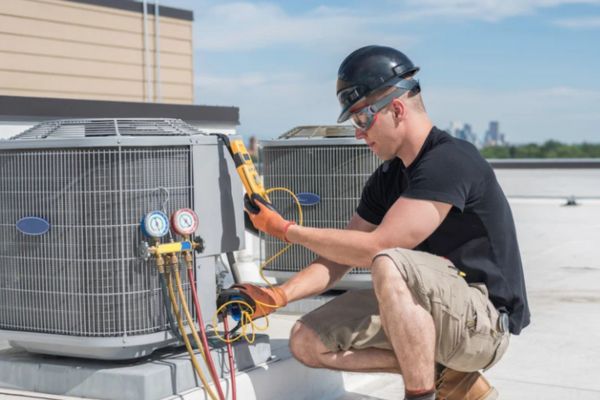Finding the perfect air conditioner for your home involves understanding the options available and how they meet your needs. From cooling large spaces to finding energy-efficient solutions, here’s a guide to help you make an informed decision.
1. Central Air Conditioner
A central air conditioning system uses ductwork to cool your entire home. It consists of an indoor unit (with evaporator coils) and an outdoor unit (with a condenser). This is ideal for consistently cooling larger homes.
Price Range: $3,900 to $7,900
Pros:
- Efficient for cooling large spaces.
- It provides even cooling throughout the home.
Cons:
- Higher installation costs.
- Requires ductwork, which may not be present in older homes.
2. Ductless Mini-Split System
A ductless system features an outdoor compressor and one or more indoor units, offering targeted cooling for specific areas without the need for ducts. It’s ideal for homes with impractical duct installation or zoned cooling.
Price Range: $2,000 to $14,500
Pros:
- Highly energy-efficient.
- Flexible installation options for homes without ducts.
Cons:
- Higher upfront costs, especially for whole-home cooling.
- It may require multiple units to cool larger spaces.
3. Window Air Conditioner
A window AC is a compact unit installed in a window to cool a single room or small area. It’s one of the most affordable and straightforward options for renters or those needing temporary cooling.
Price Range: $150 to $750
Pros:
- Affordable and easy to install.
- Suitable for cooling small spaces or individual rooms.
Cons:
- Limited cooling capacity, not suitable for large areas.
- It can obstruct window views and reduce natural light.
4. Portable Air Conditioner
A portable air conditioner is a freestanding unit that can be moved from room to room, venting hot air through a window or other opening. These are great for temporary or supplemental cooling needs.
Price Range: $300 to $1,200
Pros:
- Easy to move and set up.
- It is ideal for temporary or supplemental cooling.
Cons:
- Less energy-efficient than other types.
- It can be noisy and take up floor space.
5. Floor-Mounted Air Conditioner
Installed near the floor, this type of air conditioner is often seen in hotels and provides cooling directly to a single room or small space.
Price Range: $1,500 to $3,000
Pros:
- No ductwork is required.
- It is practical for small spaces.
Cons:
- Generally louder than other systems.
- Limited to cooling one room at a time.
6. Geothermal Air Conditioning
Geothermal systems use the earth’s stable underground temperature through a ground-source heat pump to heat and cool your home. They offer long-term energy savings but require significant initial investment.
Price Range: $10,000 to $30,000
Pros:
- Extremely energy-efficient and eco-friendly.
- Low operating costs over time.
Cons:
- Very high installation costs.
- Requires significant land area for installation.
7. Hybrid/Dual Fuel Air Conditioner
This system combines an electric heat pump with a gas furnace, automatically switching between the two for optimal energy efficiency. It offers year-round energy savings by adjusting to outdoor temperatures.
Price Range: $2,500 to $10,000
Pros:
- Energy-efficient in both heating and cooling modes.
- Reduces energy consumption based on outdoor temperatures.
Cons:
- Complex and expensive installation.
- Requires both gas and electric connections.
Key Considerations When Choosing an AC Unit
When selecting the best air conditioning system for your home, take these factors into account:
- Budget: Consider both upfront installation costs and long-term energy expenses. Systems with higher energy efficiency might cost more initially but save money over time.
- Space Requirements: Assess the size of the area you need to cool. Larger homes often need more powerful systems like central AC or multiple mini-split units, while smaller rooms may only require a window or portable unit.
- Energy Efficiency: Look for units with high SEER (Seasonal Energy Efficiency Ratio) ratings. Higher SEER units consume less energy and can significantly save your utility bills.
- Cooling Power (BTUs): Ensure the air conditioner has adequate BTU capacity for the size of the area you want to cool. Rooms with more square footage will need higher BTUs to maintain comfortable temperatures.

Making the Right Choice
Choosing the right air conditioner for your home is about balancing your budget, space requirements, and cooling needs. By understanding the pros and cons of each type of air conditioning system—and considering the price ranges—you can make a smart, informed decision that ensures your home stays comfortable all year long. Home Star is your top directory for connecting with trusted HVAC professionals who can guide you through installation, repair, and maintenance for your cooling needs.



